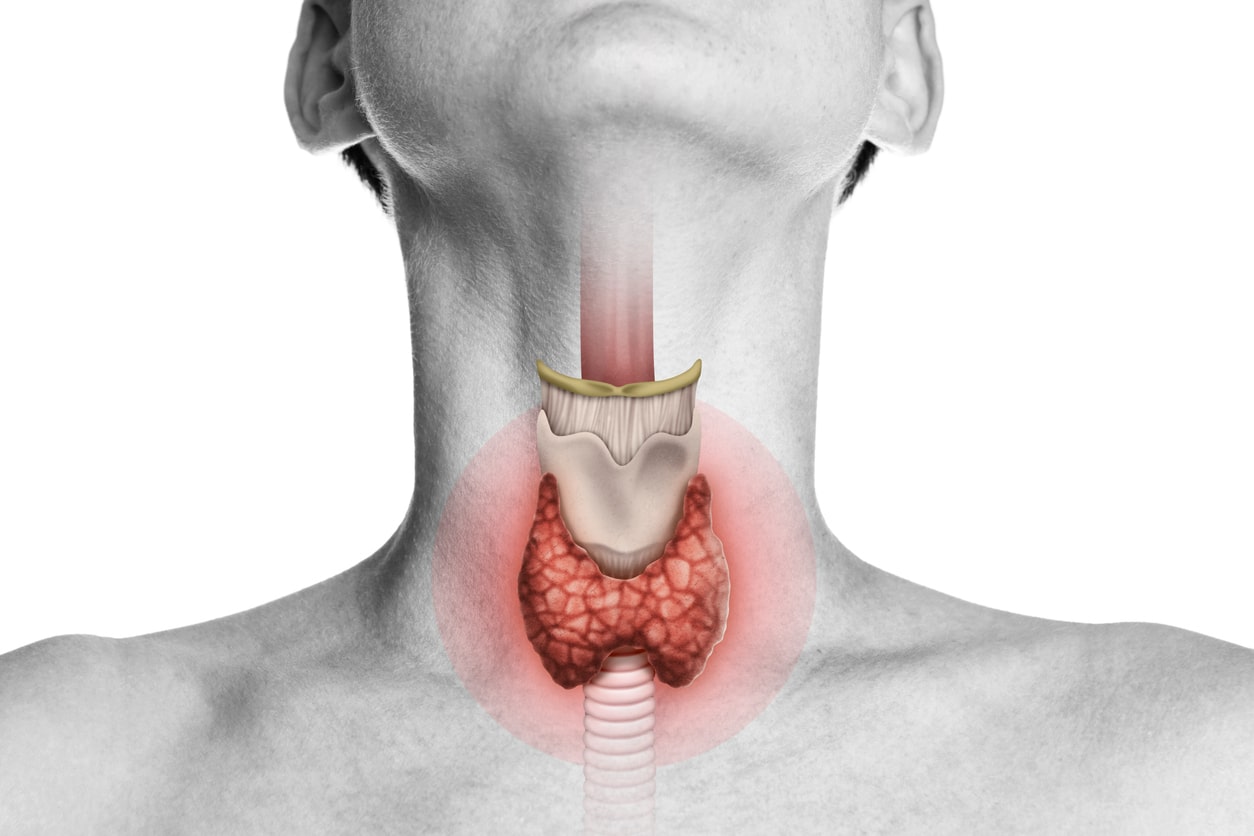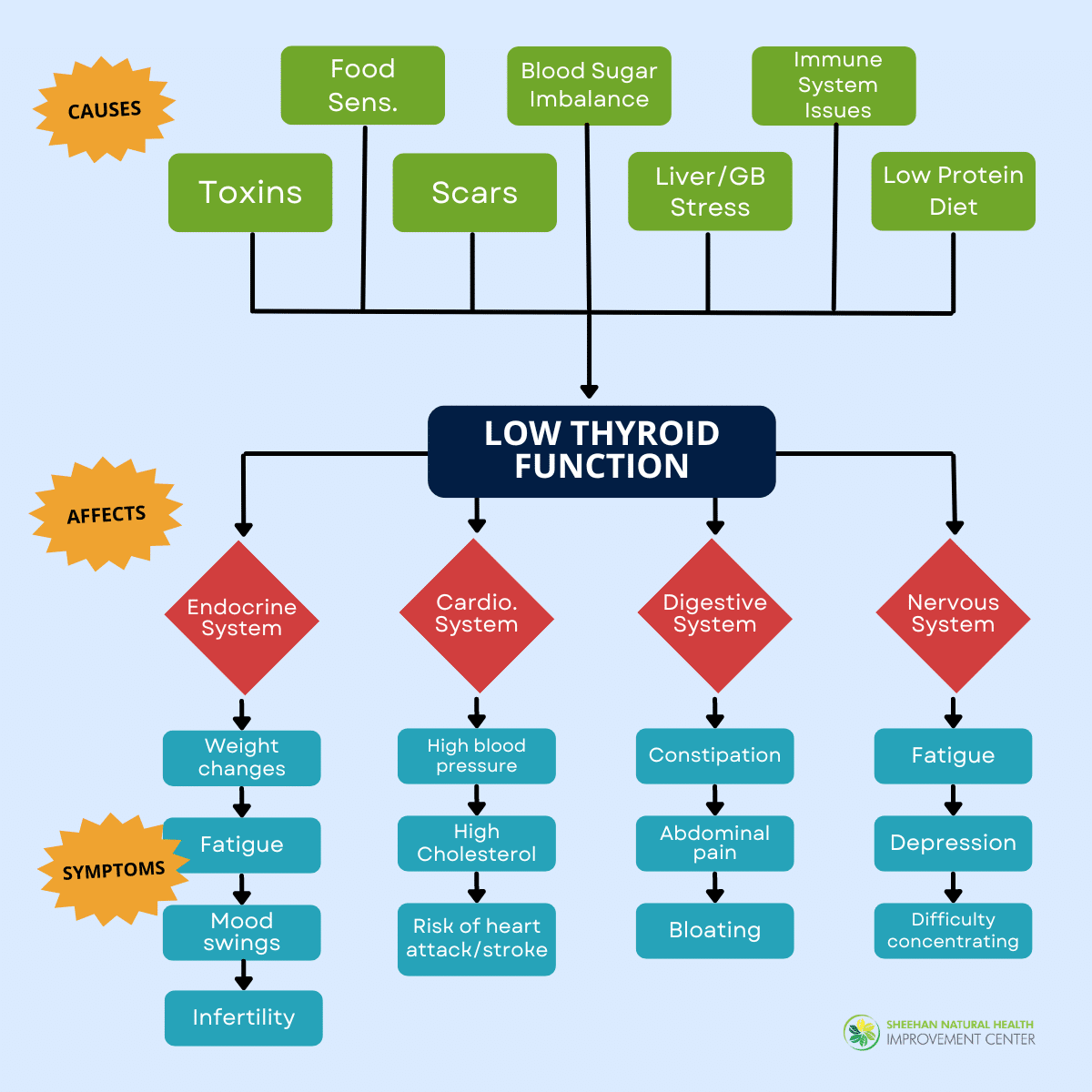Table of Contents
1. Understanding Your Thyroid
2. How Low Thyroid Function Affects the Body
3. Reduce Your Exposure to Toxins
4. Avoid Foods You Are Sensative To
5. Support Your Immune System
6. Optimize Your Liver and Gallbladder Function
7. Rule Out Scar Interference
8. Eat Enough Protein
9. Balance Your Blood Sugar
10. Check Your Thyroid Levels
11. Thyroid Case Studies
The thyroid, a small yet mighty gland, plays a crucial role in regulating metabolism, energy levels, and overall health. Unfortunately, thyroid issues are increasingly common, but the good news is that there are many effective, natural, and proactive steps to improve your thyroid health, helping you achieve a balanced, vibrant life.
Understanding Your Thyroid
The thyroid is a small, butterfly-shaped gland in the neck. It plays a vital role in maintaining the body’s metabolism and growth. The thyroid produces hormones that regulate many of the body’s functions, including metabolism, heart rate, body temperature, and much more.

Unfortunately, thyroid conditions are common in the United States.
According to the American Thyroid Association:
- An estimated 20 million Americans have some form of thyroid disease.
- Up to 60% of those affected are unaware of their condition.
- It is estimated that nearly 30 million Americans have an undiagnosed thyroid condition.
Hypothyroidism
The most common thyroid condition is an underactive thyroid or hypothyroidism.
This occurs when the thyroid does not produce enough of the hormones it needs to regulate the body’s functions. Symptoms of hypothyroidism include:
- Fatigue
- Weight gain
- Dry skin
- Depression
What is not well understood is that an autoimmune disorder called Hashimoto’s disease is the most common cause of hypothyroidism. In many cases, this condition can be caught early and prevented from progressing into hypothyroidism if the patient takes proper steps to improve their health.
Hyperthyroidism
Another, somewhat less common thyroid condition is an overactive thyroid or hyperthyroidism.
This occurs when the thyroid produces too many of the hormones it needs to regulate the body’s functions. Symptoms of hyperthyroidism include:
- Weight loss
- Rapid heart rate
- Anxiety
- Irritability
How Low Thyroid Function Affects the Body
When the thyroid gland isn’t functioning properly, it can have a major impact on the body.
Endocrine System
The most obvious organ system affected by low thyroid function is the endocrine system. The endocrine system is responsible for producing hormones, and the thyroid gland is one of the major glands in this system.
When the thyroid isn’t producing enough hormones, it can lead to an imbalance in the other hormones produced by the endocrine system, resulting in a variety of symptoms. Other endocrine organs that can be affected by low thyroid are, for example, the adrenals, ovaries in women, and testes in men.
Cardiovascular System
Another organ system affected by low thyroid function is the cardiovascular system. People with hypothyroidism are at an increased risk for high cholesterol, high blood pressure, and other cardiovascular issues. These conditions can lead to an increased risk of heart attack and stroke.
Digestive System
The digestive system is also affected by low thyroid function. People with hypothyroidism often experience constipation, abdominal pain, and bloating. They may also have difficulty absorbing nutrients from food, which can lead to deficiencies in vitamins and minerals.
Nervous System
Finally, the nervous system can be affected by low thyroid function. People with hypothyroidism often experience fatigue, depression, and difficulty concentrating. They may also have difficulty with their memory and focus.
Low thyroid function can have a significant impact on the body, and it’s important to get it treated as soon as possible. If you think you may have hypothyroidism, it’s important to talk to your doctor and get tested. Treatment is available, and it can help you feel better and improve your overall health.
Steps to Improve Your Thyroid Health Naturally
1. Reduce Your Exposure to Toxins
Unfortunately, toxins can affect the thyroid, leading to a range of health issues. Toxins can be found in a variety of sources, including the environment, food, and water.
Environmental Factors
Some of the most common environmental toxins that can affect the thyroid include heavy metals such as lead, mercury, and cadmium. These toxins can interfere with the production of thyroid hormones, leading to an imbalance in the body’s hormones.
Toxins can also be found in food and water. For instance, certain types of fish, such as tuna and swordfish, contain high levels of mercury, which can interfere with the production of thyroid hormones.
In addition, pesticides and other chemicals used in farming can also be sources of toxins. These chemicals can disrupt the body’s delicate balance of hormones, leading to a range of health issues.
Lifestyle Factors
In addition to environmental toxins, lifestyle choices can also affect the thyroid. Smoking and excessive alcohol consumption can interfere with the body’s ability to produce hormones, leading to an imbalance in the body’s hormones.
Stress can also affect the thyroid, leading to a buildup of toxins in the body.

The best way to protect the thyroid from toxins is to limit exposure to them. This includes avoiding sources of environmental toxins, such as lead, mercury, and cadmium, as well as avoiding foods and drinks that contain high levels of toxins. Body care and cleaning products are common sources of unwanted toxic exposure to your body.
In addition, limiting stress and avoiding smoking and excessive alcohol consumption can help protect the thyroid from harm. By taking steps to reduce exposure to toxins, you can help to improve your thyroid health and maintain optimal health overall.
2. Avoid Foods You Are Sensitive to
There are several ways that food sensitivities can have an impact on your thyroid health, and understanding these links can help you to better manage your condition.
Autoimmune Response
Food sensitivities can lead to an autoimmune response, which can cause the body to attack its own tissue, including the thyroid gland. This type of autoimmune response is known as Hashimoto’s thyroiditis and can cause the thyroid to become inflamed and produce fewer hormones.
Inflammation
Another way that food sensitivities can affect thyroid function is through inflammation. When the body is exposed to irritants or allergens, it can trigger an inflammatory response. This inflammation can affect the thyroid by promoting the production of antibodies that attack the gland and interfere with its ability to produce hormones.
Nutritional Deficiencies
Finally, food sensitivities can cause nutritional deficiencies. If you are not able to digest certain foods properly, you may not be receiving the nutrients your body needs to properly produce hormones. This can lead to a deficiency in essential nutrients like iodine, selenium, zinc, and B vitamins, which are necessary for the proper functioning of the thyroid.
The foods that are most linked with Hashimoto’s and low thyroid are wheat, dairy, and sometimes eggs. We have observed many times that cutting out reactive foods has a profound impact on a person’s thyroid and overall health.
3. Support your Immune System
The immune system and thyroid health are inextricably linked, with each one influencing the other. The relationship between the two is complex and not fully understood, but there is evidence to suggest that they are connected. We observe the connection often clinically in our patients.
The thyroid plays a role in the immune system, as the hormones it produces can affect the body’s ability to fight off infection and disease. When the thyroid isn’t functioning properly, the immune system can be compromised, making it more difficult for the body to fight off infection and disease.

On the other hand, the immune system plays a role in thyroid health as well. The immune system is responsible for producing antibodies that help protect the body from infection and disease. When the immune system is strong and healthy, it can help protect the thyroid from autoimmune diseases, such as Hashimoto’s disease, which is an autoimmune disorder that destroys the thyroid gland.
Improving the health of your immune system and its ability to fight infections can be one of the most important steps to improve your thyroid health.
4. Optimize your Liver and Gallbladder Function
When it comes to overall health, the thyroid, liver, and gallbladder are all interconnected. The liver and gallbladder, located in the upper right quadrant of the abdomen, are responsible for the production and storage of bile and the digestion of fats.
The thyroid, liver, and gallbladder are all intricately connected through their physiologic functions.
When the thyroid is functioning correctly, it helps the liver to produce adequate amounts of bile and the gallbladder to store it. Bile is essential for the digestion of fats, which are important for energy production, hormone production, and nutrient absorption.
When there is an imbalance in the production of thyroid hormones, it can lead to inadequate bile production and storage, which can have a negative effect on the body’s ability to process fats.
Additionally, when the thyroid is not functioning properly, it can lead to a build-up of toxins in the liver and gallbladder. This can cause a variety of symptoms, such as fatigue, digestive issues, and skin problems.
The build-up of toxins can also lead to a condition known as liver and gallbladder stagnation, which can cause a wide range of digestive issues, including constipation, bloating, gas, and indigestion.
When the thyroid is functioning properly, it helps the liver to produce adequate amounts of bile and the gallbladder to store it. However, an imbalance in thyroid hormones can lead to inadequate bile production and storage, as well as a build-up of toxins in the liver and gallbladder.
To ensure optimal health, it is important to maintain a healthy balance between the thyroid, liver, and gallbladder through the proper nutritional approaches.
For more information on the importance of the liver and gallbladder, click here. Especially if liver/gallbladder symptoms apply to you!
5. Rule out Scar Interference
The thyroid is connected to three major meridians in Chinese medicine, the Lung meridian, the Heart meridian, and the Governing Vessel. These meridians are believed to be responsible for the communication between the thyroid and the rest of the body.
The Lung meridian is connected to the front of the neck and runs along the front of the throat, connecting the thyroid and the lungs. This meridian is responsible for regulating the body’s energy levels, and when it is blocked, it can cause a range of symptoms including fatigue, difficulty breathing, and an irregular heartbeat.
The Heart meridian is connected to the back of the neck, and runs along the back of the throat, connecting the thyroid and the heart. This meridian is responsible for regulating the body’s emotional balance, and when it is blocked, it can cause a range of symptoms including anxiety, depression, and insomnia.
The governing vessel is one of the main meridians in Traditional Chinese Medicine (TCM). It is the longest of the meridians and runs up the spine and around the head, connecting the body’s organs and systems.
According to TCM, the governing vessel is connected to the adrenals, kidneys, and thyroid. This is important because when the governing vessel is out of balance, it can cause problems with the thyroid.
Scars on the surface of the skin can affect the internal communication systems of the body by interfering with any of these meridians and their thyroid connection. To read more about scars and how they affect your health, read this interesting article from Dr. Kaslow.
In our office, we handle the energy disruption caused by scars using a simple, non-invasive approach. In many cases, the scar interference must be handled before the thyroid can completely heal. Missing this step can make the difference between success and failure in your quest to improve your thyroid health.
6. Eat Enough Protein
Protein is essential for thyroid health.
Proteins are made up of amino acids, which are the building blocks of life. They’re essential for energy production and cell repair, and they also help the body absorb other nutrients.
The thyroid needs protein to produce hormones, which are essential for metabolism and other bodily functions. Without enough protein, the thyroid won’t be able to produce enough hormones, leading to a wide range of symptoms, including fatigue, weight gain, and depression.
Protein is also needed to repair and regenerate your thyroid tissue.
The thyroid needs the right balance of amino acids to produce the hormones it needs, so it’s important to get enough protein from your diet. Eating a balanced diet with plenty of meat (solid protein) is essential.
Need more evidence? Read this article on PubMed.
7. Balance your Blood Sugar
Unfortunately, many people are unaware of how important it is to maintain a healthy balance of blood sugar to ensure optimal thyroid function.
Blood sugar is a key component of thyroid health because it helps to regulate the production of hormones that the thyroid needs to function properly.
When blood sugar levels are low, the thyroid does not get the nutrients and hormones it needs, which can cause it to become sluggish. This can lead to several issues, including fatigue, weight gain, and depression.
When blood sugar levels are high, this can lead to inflammation which also has negative effects on the thyroid and the body’s ability to properly utilize thyroid hormones.
To make matters worse, blood sugar swings can lead to stress on the immune system, potentially triggering an autoimmune reaction that will damage the thyroid.
For optimal thyroid health, it is important to maintain a healthy balance of blood sugar. This can be achieved through a balanced diet that is rich in healthy carbohydrates, proteins, and fats, and includes regular exercise.
Additionally, it is important to monitor blood sugar levels and take steps to regulate them if necessary. By taking the necessary steps to ensure proper blood sugar balance, you can help to ensure that your thyroid remains healthy and functions optimally.

8. Check Your Thyroid Levels
When it comes to maintaining optimal thyroid health naturally, one of the crucial steps to improve your thyroid health is ensuring that your thyroid levels are properly checked and monitored. Conventional thyroid tests often focus solely on TSH (Thyroid Stimulating Hormone) levels, which can sometimes overlook underlying issues.
Did you know that TSH is a brain hormone? TSH is a hormone produced by the pituitary gland in the brain that regulates the production of hormones in your thyroid, such as T3 and T4.

To get a more comprehensive view, consider looking at functional lab markers that provide deeper insights into thyroid function.
Functional medicine practitioners often recommend assessing markers beyond just TSH. These include Free T3 (Triiodothyronine), Free T4 (Thyroxine), and sometimes Reverse T3.
Free T3 is crucial as it represents the active form of thyroid hormone that affects metabolism and energy levels directly.
Free T4, on the other hand, indicates the amount of thyroid hormone available for conversion into T3.
Reverse T3, while less commonly checked, can reveal if there’s a metabolic imbalance affecting thyroid function.
These functional lab markers offer a more nuanced understanding of thyroid health because they reflect how well the thyroid gland is functioning and how effectively thyroid hormones are being utilized by the body. Imbalances in these markers can point to issues such as inflammation, nutrient deficiencies (like iodine and selenium), adrenal dysfunction, or even autoimmune conditions like Hashimoto’s thyroiditis.
It’s also important to check lab markers for other areas of the body associated with thyroid function, as indicated in the steps above such as: blood sugar markers, liver and gallbladder markers, immune system markers, and food sensitivity markers.
Understanding these markers in the context of holistic health is essential for getting your thyroid levels back to normal because thyroid function influences almost every system in the body. Optimal thyroid function supports metabolism, energy production, mood regulation, and even cardiovascular health.
By addressing underlying imbalances indicated by these markers, through lifestyle changes, diet adjustments, and targeted supplementation, you can support overall thyroid health and promote greater well-being throughout your body.
Here at Sheehan Natural Health, we specialize in using functional blood tests using our system: Nutritional Blood Chemistry™ (NBChem™). This system analyzes functional lab tests in a specific sequence to find root causes of thyroid dysfunction and prioritizes the areas that need to be handled for each patient, such as when to prioritize food sensitivities, immune system health, blood sugar balance, or thyroid health.
Thyroid Case Studies
With extensive clinical experience as holistic health practitioners, we’ve helped many people improve their thyroid health through natural, personalized approaches.
In this section, we’ll share detailed case studies from our practice, showcasing diverse strategies and treatments that have led to remarkable improvements.
In our office, each patient is treated as an individual. The outcome and results of each case depend on several factors. For example, how severe the problem is, how long the patient has had the problem, whether the patient is already taking medication, and how well the patient follows the recommended natural health care plan-in other words their level of commitment to getting well naturally.
Here are a few scenarios of the types of thyroid cases and responses that we have gotten.
Leila – Panic Attacks, Hormonal Mood Swings, Urinary Tract Infections, Hashimoto’s
- Woman in her late 50s – knew she was hypothyroid, but didn’t know she was autoimmune hypothyroid
- Had severe hormonal issues (which improved greatly)
- Mildly hypothyroid according to Nutritional Blood Chemistry™
- High level of commitment to dietary changes and supplement program
- Feels much better and has been able to stay off meds
- As an added unintended bonus, easily lost 15 pounds!
Lena – Overweight, Diabetes, Low Energy
- A woman in her late 50s who wanted to lose weight and get healthy
- She had already been on thyroid medication for a long time
- Lena was diabetic and when she went on a program to improve her blood sugar control and followed the thyroid healing diet (anti-inflammatory, no gluten, no dairy), her blood sugar issue improved. Blood sugar issues put severe hormonal stress on the thyroid.
- She had never been able to lose more than 12 pounds on any program.
- Now she’s down 15 pounds and counting. Her energy is improving, too! She’s also not diabetic anymore. She’s reversing her diabetes.
Ivan – Overweight, Neck Pain, Back Pain, Joint Pain, High Cholesterol and Triglycerides
- A young man in his mid-20s
- Needed to lose weight and had severe back pain, neck pain, and joint pain
- He had quite a number of issues as revealed by Nutritional Blood Chemsitry™: autoimmune thyroid (which he did not know about), diabetes, and extremely high cholesterol and triglycerides.
- Food testing revealed an extreme immune reaction to wheat (which he had no idea of beforehand).
- His dairy-free keto diet plan and designed clinical nutrition program are reversing everything!
- He has avoided taking ANY medications.
Maura – Pain and Stiffness in Neck, Knees, and Shoulders
- A woman in her mid-50s–not identified as autoimmune thyroid, but thyroid numbers were fluctuating showing many thyroid stressors were present.
- Many food sensitivities are present, especially wheat (very common, may I even say universal for thyroid cases).
- Great response to care as long as she follows her diet.
- Commitment to dietary changes is unstable; feels she needs to eat wheat to “have fun” and “enjoy herself”- results are inconsistent as a result.
- Still not taking any meds in spite of dietary wavering.
Brian – Achey Muscles and Joints, Neck Pain, and Back Pain
- Man in his late 50s–didn’t know he was autoimmune thyroid.
- The main symptoms have been neck pain, back pain, and general achiness.
- Very committed to avoiding gluten and wheat – once in a while he falls “off the wagon” and his symptoms flare up.
- Has been able to stay off meds on immune/inflammation/thyroid supplementation support program (diet and supplements).
- His condition was complicated by iron overload, which may have a genetic component, and is complicated by food sensitivities, microbiome disturbances, and immune system challenges that are usually unknown to the patient.
- In Brian’s case, the major precipitating factors affecting his thyroid were food sensitivities to gluten and dairy, and problems with methylation (taking a methylated B9/B12 supplement also made him feel better.)
Maggie – Overweight, Bloating and Constipation
- Mid-50s woman whose symptoms were overweight, bloating, and constipation.
- Also, under severe stress in her daily life taking care of her elderly father.
- She knew she was hypothyroid, but she couldn’t take the medication because it made her feel worse (this is often the case with patients with hypothyroidism–they can’t take thyroid medication because it makes them feel worse; if they do not handle the underlying causes of inflammation, usually food sensitivities, blood sugar issues, immune challenges, and methylation issues).
- Aside from food sensitivities (which affect almost everyone with thyroid issues because of the link to leaky gut and autoimmunity), Maggie’s primary factors affecting her thyroid balance were poor sugar handling and insulin resistance.
- Maggie’s immune system also needed work.
- Progress is slow but steady. She now feels better when she takes her meds, which means her inflammation and liver are improving, allowing her to convert thyroid hormone more effectively.
Conclusion
Taking charge of your thyroid health naturally is a powerful step towards overall wellness and vitality. By incorporating the strategies shared here, you can support your thyroid function and enhance your quality of life. Of course, these are not the only steps you will need to take. Improving your thyroid health is only one aspect of the total health improvement program we offer at our office.
To help you get started, schedule a free phone consultation where we can discuss your specific needs and create a personalized plan. Click the link below to book your consultation today and take the first step towards a vibrant, thriving thyroid!
Talk to a Practitioner
Before you take the leap to get started, sign up for a free 15-minute phone consultation and talk with a practitioner to learn if this unique program is right for you.

